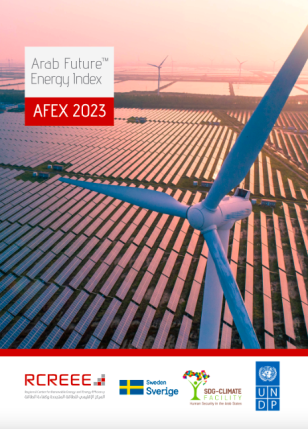Arab Future Energy Index 2023

Arab Future Energy Index 2023
September 20, 2023
2023 Summary
The Arab Future Energy Index™ (AFEX) is the first native Arab index dedicated to monitoring and analyzing sustainable energy competitiveness and governance in the region. Since its launch in 2013, AFEX ™ became a policy assessment and benchmarking tool. It offers both quantitative and qualitative analysis for key renewable energy and energy efficiency market dimensions. 20 Arab Countries are ranked under more than 50 indicators that illustrate key energy market aspects including policies, institutional and technical capacities, strategies, socioeconomic data, and investments. AFEX 2023 ranks 20 countries progress on regulatory and institutional structures, financial innovations, policy frameworks and public and private investments as a means of chronicling progress made by countries across the region on SDG 7 on energy and the Paris Agreement.
This year’s report highlights regional achievement in all the three targets of SDG 7: universal access to clean energy, expanding the share of renewable energy in energy mix and increased energy efficiency.
The renewable energy share reached approximately 7% in installed capacities. The dominant renewable energy technology is photovoltaic (PV) followed by wind energy; 60% and 32% respectively (without accounting hydro power capacity). Hydro power has the largest installed capacity with approximate capacity of 11.1 GW. Other technologies combined capacity has surpassed the installed hydropower capacity for the first time in 2020. The installed capacity by 2020 is 12.4 GW, compared to the 7.2 GW in 2018. Around 5 GW were added in 2 years. PV capacity increased from 3.2GW by the end of 2018 to 7.4GW by the end of 2020.
As for energy efficiency, the energy intensity of growth has increased since 1990 in most Arab countries and is above the European average. It is considered as relatively high. Volatility in international oil prices have, in part, encouraged Arab countries to undertake various reform actions and make progress in reducing their energy subsidies. The region witnessed an unprecedented wave of energy subsidy reforms with 6 countries carrying out reforms in 2014 and 13 countries in 2020. Many Arab countries managed to reduce the money spent on energy subsidies, but they are still spending considerable financial resources on it.
In relation to energy access, only 6 Arab countries have low electricity access: Djibouti, Libya, Mauritania, Sudan, Syria, and Yemen. The rest have almost 100% access to electricity. On the other hand, most of the Arab countries have high access to clean cooking with only four Arab countries recording low rates of clean cooking access. Arab countries have three power pools for electricity trading. The Maghreb pool which includes Algeria, Libya, Morocco, and Tunisia. The EIJLPST pool which include Egypt, Iraq, Jordan, Libya, Lebanon, Palestine, Syria, and Turkey. And finally, the Gulf power pool that includes Bahrain, Kuwait, Qatar, and Saudi Arabia.

 Locations
Locations




